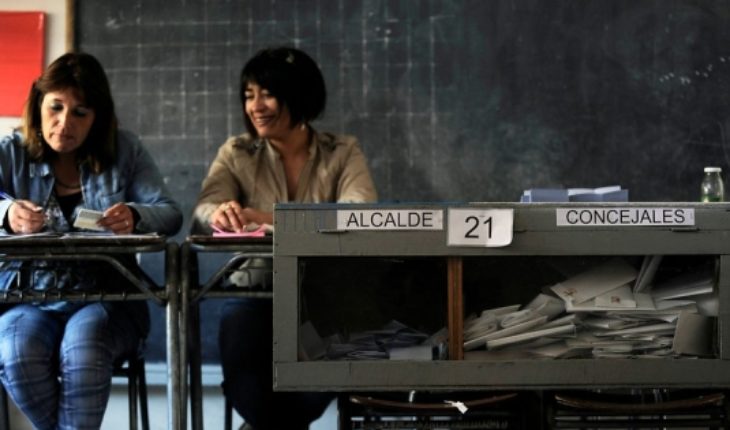some days ago, it was posted on a well-known means of communication a column called: run-off municipal to overcome the smack of the binomial, e n Javiera Toro and Rodrigo Echecopar trying to explain the benefits of a bill that seeks to establish the runoff elections of mayors in Chile.
According to them, it would be a catastrophe that the mayors leave elected with majorities relative, close to 30% of the votes. Also the article alludes to that this system would be a kind of aftertaste of the binomial, so it would have to lead to a second round of urgent, because it would be issues of “principles”, which would be unavoidable as the Frente Amplio coalition. Then, we can deduce that a pact with the centre-left would be unthinkable since they would be running on completely different lanes.
It is striking that is attributed to the dictatorship the installation of a single-member system in local elections, being that the reform of this law was launched the year 2004. In this election debuted the separation between candidates as Mayor and Councillors, as settling the proportional electoral system (d’Hondt), for the latter.
In a second order, it is necessary to clarify that the binominal electoral system and the majoritarian electoral system are not comparable, since even though the binominal has had major effects and is very stingy, it is a proportional electoral system. Yes, he governed the political competition for 26 years, incidentally. It was designed by a decision, this time of the dictatorship. They sought to create districts and constituencies based on the results of the plebiscite of the 88, which led to a draw constant between two great forces clear!; with 30% of the votes obtained 50% of the seats to contest (district magnitude 2), actually, but there was volatility in that period?
The truth is that no, only isolated cases of people who managed to circumvent the electoral system and win the election as independent. But, was modified by the year 2015, and thanks to that now there is a proportional system moderately, to choose to the representatives of the National Congress, the only results obtained in the month of November of 2017, is sufficient evidence to demonstrate that the binominalizacion of the Chilean party system, is over. Proof of this is the mess that is the former coalition Government, trying to raise a political project, and that has talked with sectors of the own Frente Amplio, to raise an agreement beyond the election, without effective results.
On volatility, the year 2011 Juan Pablo Luna and David Altman wrote an article called: stable, but not roots, Chilean political parties, and the concept of institutionalization of the party system. There are political stability (but without roots) of the Chilean political parties, but it also raises that greatest alternation in power (seen higher levels of volatility), precisely in the municipal elections, which have been able to change with increasingly parties and leaderships, versus the legislature. What taken of the binominal the majoritarian system, it is not.
On this last point, it must be stopped, if it gets attention on the “principles” would impact generates a second round, after a radical competition between political forces? Serious problems and relationships that break so irreconcilable. It is more, the time between a first and second round is so short, that the rough edges not liman, on the contrary intensify. To remember what it cost the year 2010 add to Marco Enríquez-Ominami to the candidacy of Eduardo Frei, who lost badly to Sebastián Piñera, or in its effect the recent presidential election, in which in the second round, the own Frente Amplio as Coalition, decided not to formally support Guillier, and led to a resounding defeat for the progressive sectors in Chile.
Spinning a little finer, in electoral matters, always in the run-offs, turnout decreases, except in the last election, in which the right managed to mobilize many more voters than most new. The result is available via Servel, if some doubt. However, a comparative graph of the voter turnout in elections here is 2013 and 2017 year Total register voters type choice % 2013 13575143 6669085 Presidential 1 ° 49 2013 5837312 2nd 43 2017 14308131 6667440 Pr presidential esidencial 1 ° 47 2017 7011203 presidential 2° 49 source: own elaboration based on data obtained from Electoral service of Chile
about the strategy. Flame deep attention that own Frente Amplio attempt to close the doors to a pre-election deal that decant in a primary election, why not?
According to israeli political scientist Gideon Rahat, primaries can be very effective, since the candidates that come from them receive at least 10% of award for come from democratic processes of selection of candidates. However may occur a trade-off in this process, since political relations could break, by what would also exist an effect of primary penalty, which impair the result of the candidate. Both examples, there are some competitive primaries own Frente Amplio in Valparaiso, or its effect which determined the candidacy of Beatriz Sánchez as sole leader of the coalition. In Valparaíso on the other hand, there were a penalty for the candidacy of DJ Méndez, who certainly left many injured on the road who have not joined to his candidacy. As a result, never the conclusion had a worse performance in this commune with him. But without going any further, one of the causes of the defeat of Guillier, was just his designated candidacy, which was very badly in the eyes of the public. So it would be worth the risk.
It is possible to continue enumerating effects for the primaries, since also the disadvantaged groups such as women, succumb to this kind of competition, since holding an election campaign for more than eight months, just to weaken these options.
It is hoped that this analysis allows to give more background, since if you want to bet on further decentralization, there are more urgent projects such as strengthening of the municipality as an effective local government, with powers and independence of resources. From this point of view, there are more urgent issues that treat that so little is relevant as it would be a municipal runoff election engineering.





